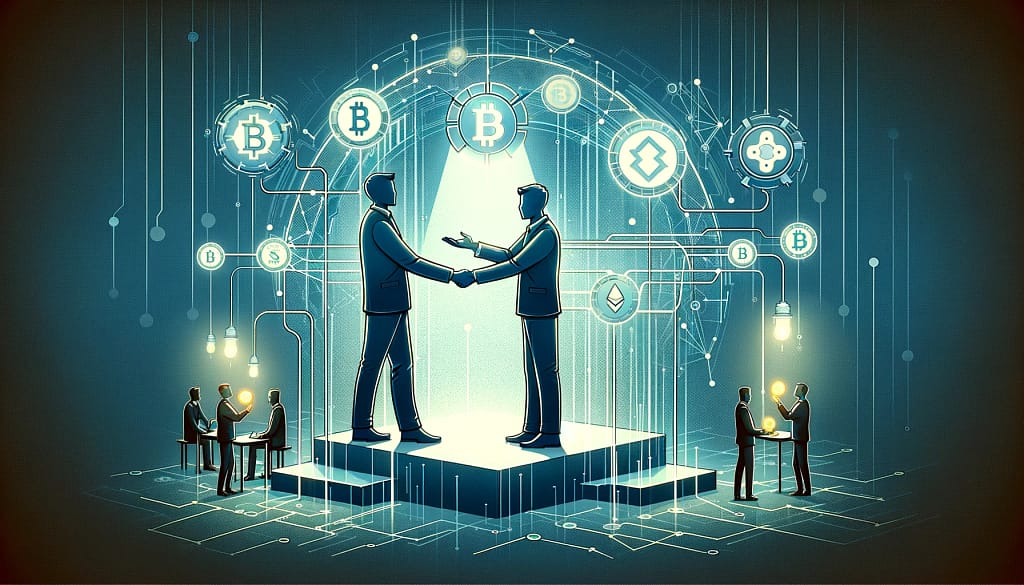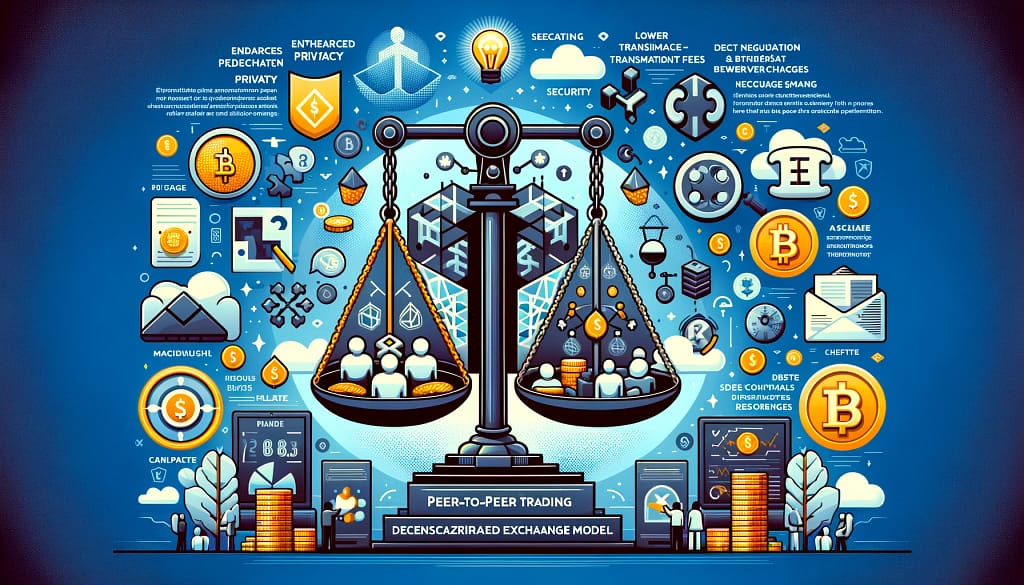
In the evolving landscape of financial transactions, peer-to-peer (P2P) trading has emerged as a groundbreaking model, especially within the realm of cryptocurrency and digital assets. At its core, P2P trading facilitates the direct exchange of assets between individuals without the intermediation of traditional financial institutions. This paradigm shift is largely enabled by the advent of decentralized exchanges (DEXs), which offer a compelling alternative to their centralized counterparts. DEXs leverage blockchain technology to create a trustless, secure environment for trading, fostering a more democratic and accessible financial ecosystem. As we delve deeper into the digital age, the significance of P2P trading and the role of DEXs continue to grow, reshaping our understanding of financial exchanges.
The Basics of Peer-to-Peer Trading
Peer-to-peer trading represents a return to the most fundamental form of trading: a direct transaction between two parties. In the context of cryptocurrency and digital assets, this means that buyers and sellers can trade with each other directly, without the need for a central authority to facilitate the transaction.
This is made possible through decentralized exchanges, which are platforms that operate on blockchain technology. Unlike traditional exchanges, which act as intermediaries by holding users’ funds and executing trades on their behalf, DEXs provide a platform where traders can execute transactions directly from their wallets.
The mechanics of DEXs involve smart contracts – self-executing contracts with the terms of the agreement directly written into code. These contracts automatically enforce and execute the terms of trade, providing a secure and trustless mechanism for transactions.
This decentralized model not only reduces the risk of security breaches and fraud but also offers a transparent trading environment where all transactions are recorded on the blockchain and are publicly verifiable.
Advantages of P2P Trading
One of the most significant advantages of P2P trading is the increased control and privacy it offers users. Since transactions are conducted directly between parties, traders have full control over their funds at all times, reducing the risk associated with entrusting assets to a third party.
This setup also enhances privacy, as trades can be completed with minimal personal information being exchanged or stored on the platform.
Furthermore, P2P trading reduces reliance on third parties, which can lead to lower transaction fees. Traditional exchanges often charge significant fees for their services, including deposit and withdrawal fees, trading fees, and more. In contrast, DEXs typically have lower fee structures since they do not bear the operational costs associated with managing users’ funds and personal information.
This cost-effectiveness, combined with the autonomy and security offered by decentralized trading platforms, makes P2P trading an increasingly popular choice among digital asset traders.
Through these mechanisms, P2P trading and decentralized exchanges are not just alternatives but are becoming the preferred choice for many in the digital asset community, heralding a new era of financial exchange that is open, secure, and accessible to all.
Risks and Considerations
While the advantages of P2P trading and decentralized exchanges are compelling, potential users should also be aware of the risks and considerations involved. One significant challenge is the steep learning curve associated with understanding how DEXs and blockchain technology work.
For newcomers, the array of wallets, smart contracts, and blockchain protocols can be daunting. Due diligence is essential, as users must navigate these complexities responsibly to ensure the security of their transactions.
Another critical aspect to consider is the potential for reduced liquidity on decentralized platforms. Unlike centralized exchanges, which often have large volumes of trades facilitating quick matchings between buy and sell orders, DEXs can suffer from lower trading volumes.
This reduced liquidity can lead to slower trade execution times and, in some cases, higher price volatility as larger orders can significantly impact market prices.

How Decentralized Exchanges Are Changing the Game
Decentralized exchanges are revolutionizing the financial trading landscape through their innovative use of blockchain technology and smart contracts. Blockchain serves as the backbone of DEXs, providing a decentralized ledger that records all transactions across a network of computers.
This not only ensures the integrity and transparency of trades but also enhances security, as there is no single point of failure.
Smart contracts further elevate the functionality of DEXs by automating the execution of trades based on predefined conditions. This eliminates the need for intermediaries, reducing transaction costs and enhancing the efficiency of the trading process. The automation and trustless nature of smart contracts also contribute to a more inclusive financial ecosystem by allowing anyone with an internet connection to participate in the global economy.
The rise of DEXs is beginning to challenge the traditional financial and banking systems by offering an alternative that is more accessible, transparent, and resistant to censorship. This shift has the potential to democratize finance, giving individuals greater control over their financial transactions and reducing the influence of centralized institutions.
The Role of Cryptocurrency in P2P Trading
Cryptocurrencies are the lifeblood of P2P trading, serving as the primary medium of exchange on decentralized platforms. These digital assets enable direct transactions between parties without the need for traditional financial intermediaries like banks. The inherent properties of cryptocurrencies, such as their global accessibility, divisibility, and security provided by blockchain technology, make them ideal for facilitating P2P exchanges. Cryptocurrencies not only simplify the transaction process by providing a common trading currency but also enhance privacy and reduce transaction times and costs.
Navigating Challenges in P2P Trading
Traders on DEXs often encounter several challenges, including navigating complex user interfaces, ensuring security of their funds against scams or technical vulnerabilities, and dealing with liquidity issues. To navigate these challenges, traders should prioritize education on the mechanics of DEXs and smart contract functionality. Utilizing reputable wallets, enabling two-factor authentication, and conducting smaller test transactions can enhance security. For liquidity concerns, participating in liquidity pools or using platforms with aggregated liquidity from multiple DEXs can offer solutions.
Future Trends and Developments
The future of P2P trading and decentralized finance (DeFi) looks promising, with several trends poised to shape the landscape. Continued innovation in blockchain technology and smart contract capabilities will likely result in more user-friendly and secure platforms. The integration of cross-chain functionality could enable seamless trading across different blockchains, broadening the market for users. Additionally, the rise of non-fungible tokens (NFTs) and tokenization of real-world assets could expand the scope of assets available for P2P trading. Regulatory developments will also play a crucial role in shaping the future of DEXs and DeFi, potentially leading to broader adoption and acceptance.
Conclusion
Throughout this exploration of decentralized exchanges (DEXs) and the world of peer-to-peer (P2P) trading, we’ve delved into the core aspects that make this financial ecosystem both revolutionary and complex. We examined the fundamentals of P2P trading, spotlighting how cryptocurrencies facilitate transactions on decentralized platforms without the need for traditional intermediaries. Our investigation into popular DEXs like OKX, PancakeSwap, and dYdX provided insight into their diverse features, from supported blockchains and trading pairs to their unique fee structures and security measures.
The advantages of P2P trading, such as increased control over assets and enhanced privacy, were highlighted alongside the essential considerations traders must acknowledge. These include the steep learning curve associated with understanding blockchain technology and smart contracts, potential liquidity challenges, and the slower execution times that can accompany decentralized trading .
Decentralized exchanges are fundamentally changing how financial transactions are conducted, offering a more accessible and inclusive trading environment. They harness the power of smart contracts to democratize trading, reduce reliance on centralized entities, and create a more open, efficient, and inclusive financial ecosystem.
However, with these advancements come new challenges and responsibilities. Aspiring traders are encouraged to approach P2P trading and the use of DEXs with caution and thorough knowledge. It’s crucial to conduct comprehensive research, understand the intricacies of the platforms you choose to use, and consider the security of your investments in the ever-evolving landscape of decentralized finance.
The future of trading and investing is bright with the continued innovation and growth of DEXs and P2P trading platforms. Whether you’re a seasoned trader or new to the cryptocurrency world, the decentralized market offers unique opportunities to manage and grow your assets. But, as with any investment, informed decisions and careful consideration of risks are paramount.